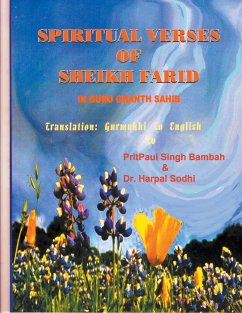Spiritual Verses of Sheikh Farid in Guru Garanth Sahib There are 130 Salokas of Sheikh Farid Ji, enshrined in Guru Garanth Sahib, from Page 1377 to Page 1384. With-in these 130 Salokas, there are few salokas enjoined by Guru Amar Das Ji and some of the shalokas by Guru Arjun Dev Ji, to supplement the thoughts of Sheikh Farid Ji. Sheikh Farid was a Saint, in Punjab, India. His (Kalam) Bani was included by Guru Arjun Dev Ji, in Guru Garanth Sahib, when he was compiling Guru Garanth Sahib, sometime between 1580 to 1600 AD. The Poet Saints were called, 'SUFI'. They were residents of India, some of them had migrated to India, from 13th century upto 1857 AD. The British Government disposed off the last Mughal Emperor, Bahadur Shah (Zafar) in 1857 AD. He had adopted the name Zafar, as he was a great Urdu poet and it was a custom that the poets used a short name to put it as a trade mark on their poetry. The Bani of Sheikh Farid is a sort of his spiritual autobiography. The language used by him is real colloquial Punjabi of that particular area, where he resided. In his shalokas he has addressed himself as Farida, which has become a style of his poetic expression. In Punjab, the Punjabi language changes its shade and pronunciation from place to place. Such as Punjabi from Frontier, Multan/Jhang Magiana, Jammu, Lahore, Ferozpur have different shades. Each place is influenced by the language of the adjoining area like Sindh, Pakhtoons, Kashmir, Himachal and on the east it is influenced by Hindi. Over and above, the Muslim culture from Persia, Arabia and Turkey introduced its own influence. Hence it may be kept in mind that if the translation of some words appears to be odd, it is due to the diversity of the language.
Hinweis: Dieser Artikel kann nur an eine deutsche Lieferadresse ausgeliefert werden.
Hinweis: Dieser Artikel kann nur an eine deutsche Lieferadresse ausgeliefert werden.








